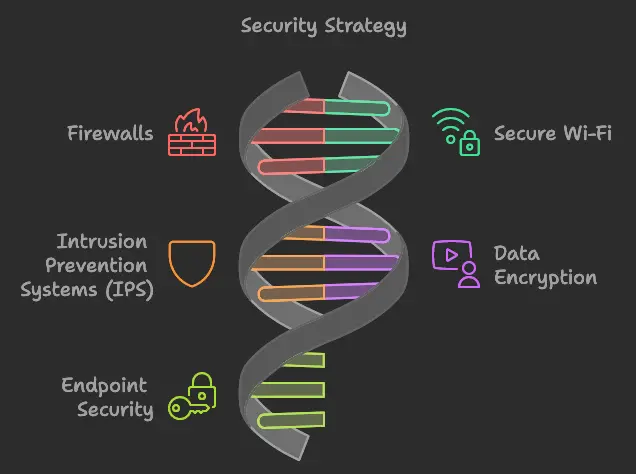
Defend Your Data: Exploring Key Types of Network Security Solutions
Today’s network security measures are as crucial as locks on a front door—arguably even more so. With cyber threats becoming increasingly sophisticated, a secure network has shifted from a mere option to an absolute necessity for every organization.
In fact, user expectations around security and speed are higher than ever. Research shows that 47% of users won’t wait longer than 2 seconds for a website to load. This highlights a dual expectation for both speed and security—where digital defenses must be robust without slowing down access.
As Chris Butler, executive VP at IP Services, says, “Comprehensive security strategies must work seamlessly with user expectations and business goals, ensuring that protection doesn’t interfere with performance.”
This insight underscores a critical aspect of modern network security: only a well-rounded approach, combining performance with protection, can truly meet the demands of today’s digital-first world.
In this blog, we’ll explore the key types of network security, from firewalls to encryption, that every business needs to consider. Discover how each layer plays a vital role in keeping your network safe while supporting uninterrupted, fast user experiences.
Core Types of Network Security Protections Every Business Needs
1. Firewalls: Protecting the Gateway to Your Network
Firewalls act as the digital gatekeepers, filtering traffic based on predefined security rules and blocking unauthorized access.
This type of network security is foundational, defending against incoming threats while allowing safe, expected data to pass through. Firewalls are essential for stopping malicious traffic before it reaches sensitive systems, reducing the risk of a breach.
For maximum security, businesses often implement next-generation firewalls capable of detecting advanced threats, making them an essential network protection measure.
2. Secure Wi-Fi: Keeping Your Connections Safe
Unsecured Wi-Fi is a major risk for businesses, with 72% of data breaches reportedly linked to insecure Wi-Fi connections.
Implementing a secure, encrypted Wi-Fi network with password protection is crucial in preventing unauthorized access and securing data in transit. By regularly updating Wi-Fi passwords and enforcing security protocols like WPA3, businesses can minimize this risk.
Implementing these steps strengthens the network’s safety and keeps sensitive data safe from external access.
3. Virtual Private Networks (VPNs): Securing Remote Access
VPNs encrypt the connection between employees and the company network, especially vital as remote work becomes increasingly common. With 56% of users connecting to public Wi-Fi networks without a password (Source), VPNs play a significant role in keeping business data private. By providing a secure path, VPNs prevent data interception over open networks, allowing employees to work securely from anywhere. Implementing a VPN not only enhances network security but also reinforces flexible work policies without compromising safety.
Advanced Network Security Types for Evolving Threats
For businesses looking to take their security beyond the basics, advanced types of network security solutions provide added resilience. Encryption, intrusion prevention systems, and access control measures form a robust approach to network protection.
1. Encryption: Ensuring Data Confidentiality
Encryption secures sensitive information by converting it into unreadable code, accessible only to those with the decryption key.
This network security type ensures data remains private even if intercepted, protecting both at-rest and in-transit data. For companies handling client or financial data, encryption is vital to maintaining confidentiality and legal compliance.
An encryption strategy not only protects your data but also strengthens trust with clients by demonstrating commitment to data privacy.
2. Intrusion Prevention Systems (IPS): Stopping Attacks Before They Happen
IPS solutions actively monitor network traffic, identifying suspicious patterns and automatically blocking potentially harmful actions.
By providing this proactive defense, IPSs reduce the chance of successful cyberattacks that could lead to costly downtime.
This type of network security keeps your network safe, continuously updated, and ready to respond to any evolving cyber threat.
3. Access Control: Ensuring Only Authorized Access
Access control limits network entry to authorized users, allowing businesses to manage who can view and modify specific information. This security type is especially crucial for protecting sensitive data, as it restricts access to only those with proper authorization. Implementing multi-factor authentication and role-based permissions creates a layered defense, ensuring only approved individuals have access to essential data. Access control supports compliance and privacy standards across various industries, reducing the risk of data leaks.
4. Network Segmentation: Limiting Damage from Breaches
Network segmentation divides a network into smaller, isolated segments, limiting the spread of potential threats. In addition to protecting against cyberattacks, this approach can also reduce the impact of non-suspicious issues, such as power outages.
In fact, according to CloudSecureTech, 43% of significant network problems result from power outages rather than malicious activity.
By isolating different network sections, segmentation ensures that critical areas remain functional even during unexpected disruptions, supporting both resilience and control over sensitive information.
| More articles you might like: |
Types of Network Security for Comprehensive Protection
Beyond foundational and advanced solutions, there are several other network security types that organizations should consider to achieve a multi-layered, resilient security posture. These types help ensure network integrity, protect sensitive information, and maintain business continuity.
1. Data Loss Prevention (DLP): Safeguarding Sensitive Data
Data Loss Prevention (DLP) tools monitor, identify, and manage data to prevent accidental or intentional leaks of sensitive information.
DLP solutions are critical for organizations dealing with confidential data, as they control data flow across networks, ensuring that sensitive information isn’t misused or mishandled. By scanning outgoing communications and identifying potential threats, DLP serves as a safeguard against data breaches, maintaining compliance with data privacy regulations and protecting an organization’s reputation.
2. Endpoint Security: Securing Individual Devices
Endpoint security focuses on protecting individual devices like laptops, desktops, and mobile devices connected to the network. Given that these devices often act as entry points for attackers, endpoint security solutions provide a vital line of defense against threats originating outside the main network.
From antivirus software to advanced endpoint detection and response (EDR) systems, endpoint security tools monitor device activity, detect vulnerabilities, and prevent malware attacks, significantly strengthening an organization’s security across all devices.
3. Network Segmentation: Limiting Damage from Breaches
Network segmentation divides a network into smaller, isolated segments, limiting the movement of potential threats.
In the event of a breach, segmentation helps contain the attack in one area, preventing it from spreading across the entire network. This type of network security is especially useful in large organizations, where separating networks by function or department can reduce risk and maintain control over sensitive information.
By implementing network segmentation, businesses can protect valuable assets and reduce the potential impact of cyber incidents.

Future-Proof Your Business with a Security Partner You Can Trust
In today’s complex cyber landscape, you need a partner with deep expertise in types of network security and a commitment to staying ahead of evolving threats. Our team of seasoned professionals delivers comprehensive security solutions tailored to your unique business environment, combining foundational protection with advanced security measures.
Contact us today to discuss how we can help protect your business and enhance your digital resilience.


